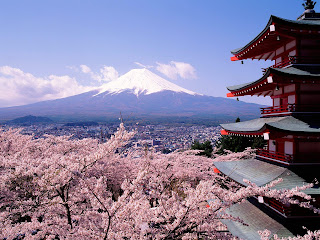
Shinto is a very fascinating religion. Although I don’t yet know too much about it, I am fascinated by what I have found out. In particular, I learned about the beliefs of life after death in Shinto. People believe strongly in kami, which are spirits. Many Shinto people believe that they may become kami after death. Either that or they will be with the kami when they die. People also believe that they become one with nature after death. Meaning they escape to the sky and specifically, to the mountains when they pass away.

An interesting belief, which I find rather disturbing, is the idea of water children. It is sometimes said that when a Shinto child dies they continue to plague and terror the other Shinto belief. I don’t think I would be want to part of a religion with this belief, for I would constantly be in fear. However, it is not very popular and there are other beliefs, which trump them. Another intriguing part of their religion is their shrines. They are very famous specifically the one in water.

The movie, Spirited Away, has some very blatant Shinto beliefs throughout. It is a movie I would recommend for everyone. My favorite part of it, which I loved, was when they bathed the river spirit. Nature and purification are a huge part of Shinto, and those ideas were all throughout the movie. The specific part with the river spirit was the most blatant to me, though. The nature part of the religion is something I can relate to, for I find nature particularly beautiful and moving. Overall, Shinto is very interesting and there are many parts of it I would follow and be devoted to, and some I wouldn’t. However, I think that will be the case in any religion one chooses to follow.

 so Buddhism greatly appeals to me.
so Buddhism greatly appeals to me.



 c moment with their divine deity. Some of these steps are similar to other religions, such as chanting/praying, giving gifts to the deity, and the drinking and touching of holy water. However, some are very unique, such as ringing of the bells, anointing the deity, marking the third eye, and touching the fire and then your eyes. I like how Puja incorporates so many different things and rituals. They manage to be unique and yet relatable, which is very difficult to do. There are examples of deity's decorated and worshipped to the left and below. I think decorating a deity is overall a very significant and powerful way to worship a god, and i think these steps of Puja are some of the most interesting aspects of Hinduism.
c moment with their divine deity. Some of these steps are similar to other religions, such as chanting/praying, giving gifts to the deity, and the drinking and touching of holy water. However, some are very unique, such as ringing of the bells, anointing the deity, marking the third eye, and touching the fire and then your eyes. I like how Puja incorporates so many different things and rituals. They manage to be unique and yet relatable, which is very difficult to do. There are examples of deity's decorated and worshipped to the left and below. I think decorating a deity is overall a very significant and powerful way to worship a god, and i think these steps of Puja are some of the most interesting aspects of Hinduism.
